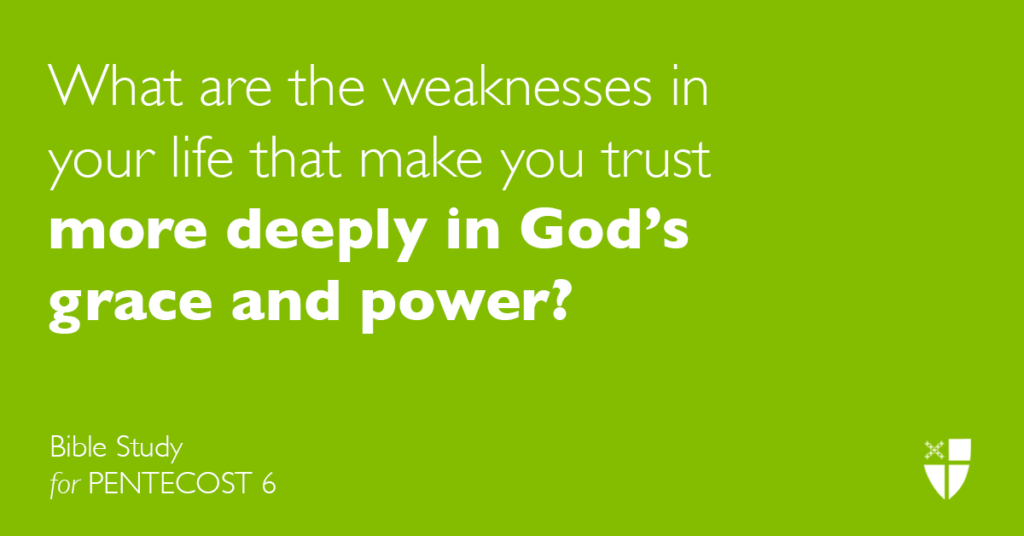Bible Study: Proper 9 (B) – 2021
July 04, 2021
RCL: 2 Samuel 5:1-5, 9-10; Psalm 48; 2 Corinthians 12:2-10; Mark 6:1-13

2 Samuel 5:1-5, 9-10
David’s journey to become king of Israel was long and complicated, which is hinted at here by the Israelites’ admission that, even when Saul was king, David was the one actually leading Israel. But the Lord was faithful to David through all of this: God promised that David would be king, and after he was made king, God was with him. David’s anointing and his later success is all attributed to God, not to David’s leadership abilities or his ambition or even his faithfulness to God in the midst of his difficulties.
Psalm 127:1 says, “Unless the Lord builds the house, / their labor is in vain who build it. / Unless the Lord watches over the city, / in vain the watchman keeps his vigil.” The Lord’s presence with us and work on our behalf is essential to our everyday lives. If we live in our own strength, our toil is meaningless; if we trust God, God’s grace and love will uphold us.
- Where do you see God’s presence in your life? How is God working on your behalf? If these questions are difficult to answer, remember that David went through a lot of hardships before he clearly saw God’s hand at work.
Psalm 48
This psalm celebrates Zion, the Temple Mount in Jerusalem, as the seat of the Lord of hosts. While not literally the center of the world, metaphorically for the Israelites this was the seat from which their God ruled. The kings of the earth fled in terror at the sight of Zion; its bulwarks and strongholds were to be lore for future generations. However, a literal historical interpretation of this psalm is inadequate, because the rulers of Babylon did conquer Jerusalem, tear down its temple, and send its people into exile. The truth of this psalm is seen elsewhere.
The greatness of God gave Zion its strength, and it was this greatness to which the Israelite people looked in praise, worship, and trust. This greatness is not threatened by earthly circumstances and rulers; God remains the sure refuge of the Israelites, who wait in the Temple on God’s loving-kindness. God’s presence would be their guide forever. And this promise is not just for the Israelites, because it is from Zion that God’s praise and justice flow to the rest of the world.
- While today we do not look to Zion as the epitome of God’s greatness, we can still see God’s greatness around us in our lives. Think of where you have seen this greatness lately. How is God a refuge for you? How do you see God’s loving-kindness to you? How does God guide you? God’s promises to us make us understand God as worthy of our praise, worship, and trust.
2 Corinthians 12:2-10
Paul here refuses to boast, although he has a right to because of the revelations which were given to him (some scholars believe that the man who was caught up to the third heaven was actually Paul himself). Instead of boasting in his strength, he reveals to the Corinthians his weakness, his thorn in the flesh. Whatever this thorn may have been, it made him more dependent on God and less likely to boast about himself, because he saw God’s power make up for his own weakness.
The unexpected aspect of power is that it is “made perfect in weakness,” or, in other words, the completion of power happens when it is actually used to compensate for some weakness. Thus, our weakness gives glory to God because God’s power is completed in it. In our weakness, God’s power can work in our lives and thus realize our lives’ full potentials. God’s power allows us to be content in our weaknesses, since we know that God’s grace is sufficient in the midst of them.
A danger of this interpretation is someone assuming that God wants us to suffer in order to make God’s power perfect, which is not what this passage is saying. Rather, here we see that the inevitable “weaknesses, insults, hardships, persecutions, and calamities” (which are found in the world because of sin) ultimately glorify God because God’s power makes us strong through them.
- How do you see God’s power dwelling with you in your life?
- What are the weaknesses in your life that make you trust more deeply in God’s grace and power?
Mark 6:1-13
Here we see Jesus both ministering in his hometown and sending out the disciples two by two to undertake their own ministry. Both encounter some forms of unbelief. Jesus’ hometown cannot accept his teaching because he is too familiar to his friends and neighbors; they only see the town carpenter. The disciples are warned that not all will welcome their message (and they have just seen a clear example of this in Nazareth). The unbelief has consequences in both instances. Still, as the disciples and Jesus travel around to villages, the good news of God’s kingdom is spread widely; people are healed and demons are cast out and repentance is preached. Humanity will resist God’s grace, gospel and healing power, but this does not end God’s ministry. God’s kingdom will prevail even in the midst of our unbelief.
- Where do you see resistance to God’s message and power, either in your own life or in your ministry? How can you trust God to help you overcome this resistance?
- Where do you see God’s power to heal and teach in your life and in your ministry?
Don’t forget to subscribe to the Sermons That Work podcast to hear this sermon and more on your favorite podcasting app! Recordings are released the Thursday before each liturgical date.
Receive Free Weekly Sermons That Work Resources!


